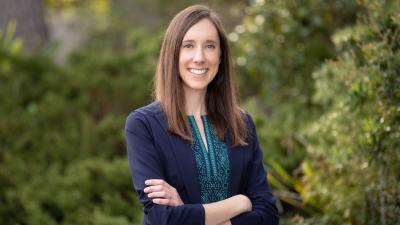Caribou Biosciences CEO Rachel Haurwitz, Ph.D., has nothing but praise for the autologous CAR-T cell therapies that have provided another option for lymphoma patients. It’s just that her CRISPR gene editing company would like to do it better with an off-the-shelf approach.
In a fresh cut of data from the dose-escalation portion of the biotech’s phase 1 ANTLER trial, allogeneic cell therapy CB-010 has shown deepening overall response rates, complete response rates and a continued complete response rate at the six-month mark post-treatment.
But a familiar problem appears in this data that has led to questions in previous readouts: durability. Patients received the same lympho-deletion conditioning therapy and one of three doses—either 40 million CAR-T cells, 80 million or 120 million.

Nine out of 16 patients experienced progressive disease, with the therapy posting a 94% ORR and a 69% CR, as well as a 44% CR rate at six months.
Caribou's shares dropped nearly 11% to $7.71 in after-market trading Thursday after the results were released, compared to $8.14 at close.
“I wish CAR-T was the magic bullet that led to disease remission for every patient for all time. Unfortunately, that is not the case,” Haurwitz said. She says the 44% rate at six months is an important benchmark of durability.
Looking at CB-010’s rivals—Bristol Myers Squibb’s Breyanzi, Novartis’ Kymriah and Gilead’s Yescarta—Haurwitz thinks Caribou’s offering has the edge. Kymriah achieved 30%, Yescarta was 36% and Breyanzi hit 35% on this half-year metric.
“As I look at the autologous CAR-Ts, these are remarkable therapies, right? What they can do for some patients is extraordinary. And I see them as an incredible proof-of-concept for the power of the T cell as a therapeutic agent,” the CEO said.
But these therapies are personalized to each patient and take weeks to months to screen for the right treatment, condition the patient and manufacture. Patients can get on Caribou’s off-the-shelf treatment in days, not weeks or months.
“Our objective is to develop an allogeneic CAR-T that can meaningfully rival the responses, including the duration of responses of the autologous CAR-Ts. And I think this data demonstrates that in this patient population, CB-010 can do exactly that,” Haurwitz said.
CB-010’s overall response compares to 50% for Kymriah, 72% for Yescarta and 73% for Breyanzi. The complete response rates for the competitors were 32%, 51% and 54%, respectively. One caveat Haurwitz stressed, though, is that Caribou’s data includes just 16 patients. The competitor treatments were all tested in more than 100 patients.
Another key comparison is safety. Haurwitz noted low rates of grade 1 or 2 cytokine release syndrome—a known complication of CAR-T treatment where the immune system overheats. There were also individual cases of a type of neurotoxicity, one labeled grade 3 and one grade 4, plus one grade-3 occurence of infection.
CB-010 appeared to have a cleaner safety profile than the rivals. The closest was Breyanzi, which has clocked grade-3-or-higher CRS rates of 4%, neurotoxicity of 12% and infections in 23% of patients.
The other top side effects in the ANTLER trial were serious or severe low blood cell counts, including anemia in 50% of patients and thrombocytopenia in 69%. Haurwitz said there were no grade 5 events, which would mean a death.
Caribou has yet to pick a dose to advance into future studies, but has narrowed things down. After the smaller 40 million dose showed a favorable complete response rate at six months in an earlier cut of the data, analysts had hoped to see a higher dose spur longer responses.
It didn’t, as all three patients in the high dose group saw their disease progress; the first two patients, one with diffuse large B-cell lymphoma and one with high-grade B-cell lymphoma, progressed in the second month. Meanwhile a third patient with DLBCL experienced a complete response after the first month, only to relapse in the third month.
“My guess is we simply got unlucky with the patients who happened to enroll in this study—keep in mind these tend to be patients with fairly aggressive disease,” Haurwitz said.
While this result wasn’t what the Caribou team wanted, Haurwitz isn’t too concerned. She said this is a great example of where the FDA’s Project Optimus helps. The initiative from the Oncology Center of Excellence provides guidance on dose optimization and selection in oncology trials and aims to cut down on doses that were two high or too long. This led to side effects that weren’t necessary for a drug to be effective.
The guidance also encourages sponsors to not make decisions on a go-forward dose based on a small data set, like the three patients in Caribou’s 120 million dose arm.
“We are listening to that guidance, we are taking action on it,” Haurwitz explained. And so Caribou will advance that dose and the 80 million dose for additional consideration to inform the final selection of the recommended phase 2 dose.
Caribou is targeting CB-010 on second line patients who have certain types of large B-cell lymphoma, a subset of the relapsed refractory non-Hodgkin lymphoma population.
“Our focus is here because that's where both the medical unmet need and the commercial opportunity are evolving,” she said. “No matter how you slice and dice these data, the story remains the same: CB-010 drives quite meaningfully durable responses in these patients.”
The company plans to meet with the FDA later this year to get feedback on this population and guidance for conducting a registrational path for the second line.
So for now, Caribou is focused on providing a better first CAR-T option, but could someday move CB-010 into patients who have relapsed on these treatments—a population that didn’t even exist a few years ago.
“Look, CAR-Ts to date are an incredible example of a new modality that is working wonders for patients,” Haurwitz said. “Were excited to see that these data demonstrate that CB-010 as an allogeneic CAR-T can also drive meaningfully durable responses in these patients.”